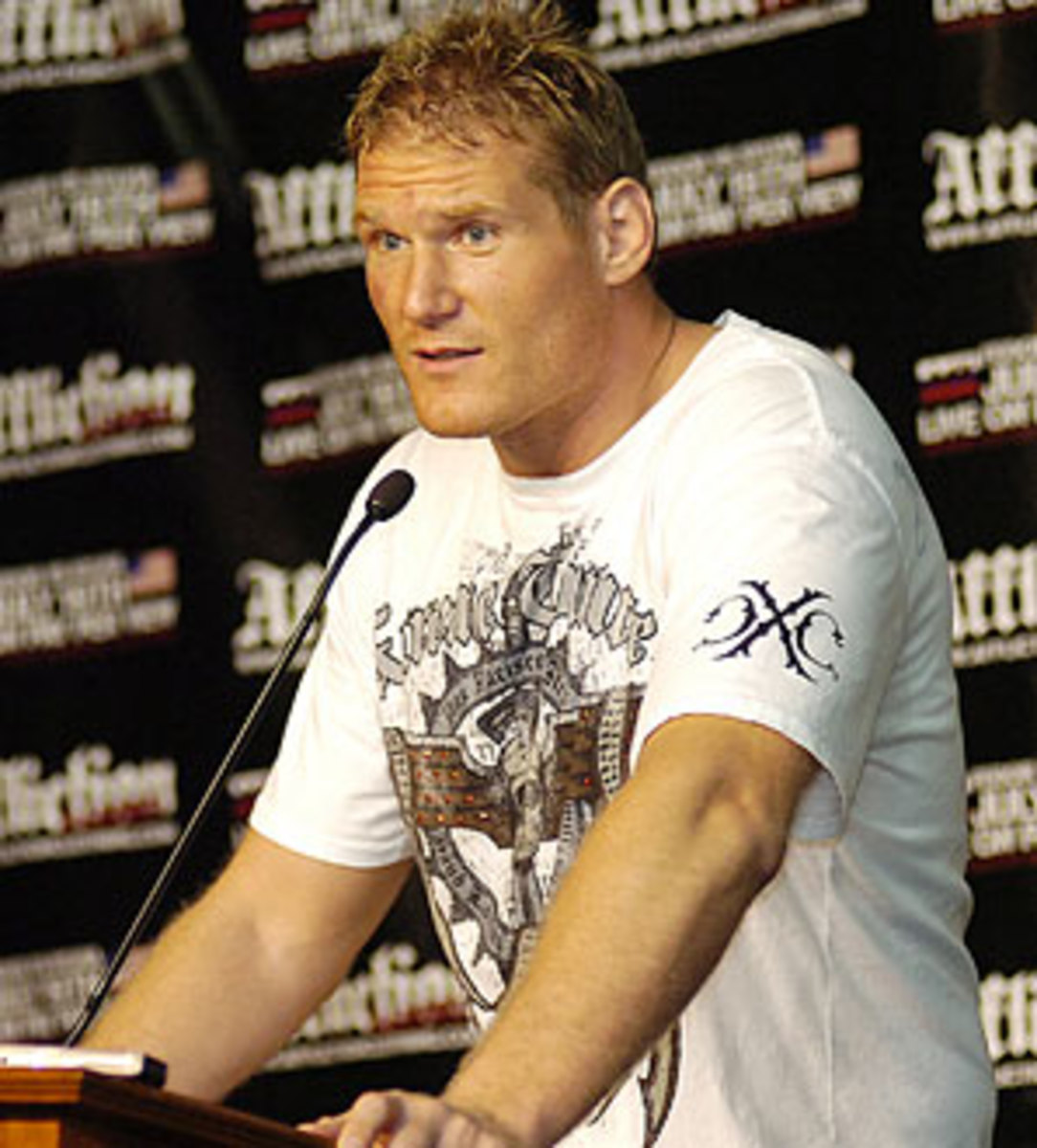
Waiting game continues for Barnett
At least Josh Barnett is consistent.
For the third time in three attempts, Barnett, who at 24 became the youngest champion in UFC history, postponed Monday an appeal hearing in front of the California State Athletic Commission to address the regulatory body's decision to deny his license after an alleged positive test in July for anabolic steroids.
While Barnett's legal team cited the need to gather additional information from the WADA facility at UCLA that conducted the test as justification for delays in August and October, the latest setback was blamed on the blizzard that slammed the Northeast over the weekend. Among the many victims of flight cancellations was Barnett's New York-based legal counsel, Michael J. DiMaggio, who was set to travel to the West Coast on Sunday for the hearing in downtown Los Angeles.
Barnett's appeal was rescheduled for Feb. 22, 2010. If he fails to fight by the the end of January, it will mark at least 12 months between bouts for the talented 31-year-old mixed martial artist.
Because Barnett, who recently earned a black belt in Brazilian jiu-jitsu from Erik Paulson, took the July urinalysis as an unlicensed combatant -- it was required as part of the process leading up to what many considered among the most anticipated heavyweight fights of the year versus Fedor Emelianenko -- the third positive test for anabolic steroids in his 12-year career did not immediately warrant a fine or suspension.
Barnett's inability to gain licensure forced him out of the bout against the heralded Russian. It also was blamed for the eventual cancellation of Affliction's Aug. 1 card in Anaheim, Calif., knocked the clothing manufacturer out of the fight promotions business, landed Emelianenko in Strikeforce and established promotional battle lines in the latter half of 2009.
The Nevada State Athletic Commission nailed Barnett (25-4) following his UFC title-winning fight over Randy Couture in 2002 after three separate anabolic steroids were found in his system. The subsequent six-month suspension resulted in the UFC's stripping the belt from Barnett, whose contract with the promoter was up for renegotiation. A third positive exam, in 2001, during the early testing phase of the NSAC drug prevention policy, went unpunished.
Barnett denies ever using anabolic steroids, and has questioned the legitimacy of the test results in California and Nevada.
Four candidates remain in the hunt to become the next permanent executive officer of the California State Athletic Commission, a position that has remained in flux since Armando Garcia resigned on Nov. 11, 2008, amid allegations of improprieties.
In closed-door meetings Monday, commissioners and officials from the Department of Consumer Affairs met with the four remaining applicants for their final interviews before one is recommended to the DCA.
The prospective candidates are: Scott Schwartz, a CSAC inspector since 1997; George Dodd, who works in Washington State at the Department of Licensing, Professional Athletics; David Finger, a district attorney working in the Southeastern portion of New Mexico; and Sacramento-based Bryan McKrell, vice president of CBG Commercial Real Estate Industry.
A decision on the new Executive Officer could take up to 30 days. California is among the most active states in the U.S. for mixed martial arts and boxing events.
On paper it may not rank among Japan's most intriguing end-of-the-year promotional efforts, but the "Dynamite!! 2009" card on Dec. 31 is certainly ambitious. With a mixture of 17 MMA and K-1 fights, including a series of bouts pitting fighters working under the Dream and Sengoku banners, the mega-event is being promoted with hopes that it can rekindle some interest among casual fighter watchers in Japan.
On Tuesday in Tokyo, promoters announced the addition of three fights, including a match between Dream and Sengoku lightweight champions Shinya Aoki and Mizuto Hirota. Aoki, the second-ranked lightweight in MMA, was originally set to fight Tatsuya Kawajiri, yet the Dream-Sengoku angle significantly flavored the card. The winner is expected to face Strikeforce lightweight champion Gilbert Melendez in 2010.
In all, nine Dream-Sengoku bouts will take place and most are well-matched: Kazuo Misaki fights Melvin Manhoef; Alistair Overeem takes on Kazuyuki Fujita; Hayato Sakurai faces Akihiro Gono; Kawajiri meets Kazunori Yokota; Hideo Tokoro clashes with Marlon Sandro; Hiroyuki Takaya battles Michihiro Omigawa; and Norifumi "Kid" Yamamoto challenges Sengoku featherweight grand prix champion Masanori Kanehara.
For the purposes of attracting casual fight fans, Satoshi Ishii, a coveted heavyweight gold medalist judoka for Japan in the 2008 Summer Olympics, was booked in his MMA debut to fight 1992 gold medalist Hidehiko Yoshida.
The card airs live in the U.S. on HDNet (3 a.m. ET), and will be replayed later in the evening.
Jason Genet, a prominent Phoenix-based manager of mixed martial artists including Shane Carwin, Benson Henderson and Efrain Escuedro, is alleged to have acted in concert with other parties to perpetrate a "pump and dump" manipulation of the common stock of China Energy Savings Technology, Inc., according to a complaint filed by the Securities and Exchange Commission.
The suit, filed in September in the U.S. District Court in the Eastern District of New York, alleges that from at least 2004 through 2006 Genet helped China Energy, a now defunct company, falsely obtain a listing on the Nasdaq National Market System; engage in unregistered distributions of securities; and enter into "secret arrangements to give away China Energy stock to persons who agreed to purchase China Energy stock in the market, and thereby created the false and misleading impression of active trading and interest in China Energy."
The SEC complaint alleges Genet "realized in excess of $1,700,000 from his sales of China Energy shares."
When contacted by SI.com, Genet declined to comment on "ongoing litigation."





